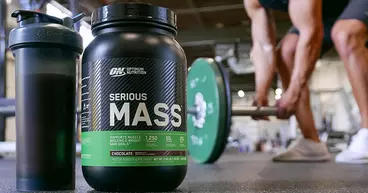 |||
7 minutes
|||
7 minutes
Both men and women may actively seek ways to put on mass to build their physique or achieve an ideal body weight. Everyone has different calorie requirements based on their age, weight, height and sex. So, is gaining weight as simple as calories in calories out? Let’s take a closer look at where to begin.
WEIGHT GAIN GOALS
It’s important to begin with a goal before calculating your estimated calorie needs. In order to gain weight, creating a plan with your specific goals is a good way to start.
Here are some recommendations:
- Determine your desired goal weight. Remember, gaining weight, mass and muscle is a process which requires patience.
- Develop a timeline in which you wish to reach your goal weight.
- Be realistic—Set yourself up for success with a realistic goal that works for you.
Step One: Set an Obtainable Goal With a Defined Plan
Example: Joe wants to gain 8 pounds in one month, therefore his goal is to gain about two pounds each week.
Step Two: Calculate Estimated Daily Calorie Needs
Determine Basal Metabolic Rate (BMR):
Male: BMR = 66.5 + ( 13.75 x weight in kg ) + ( 5.0 x height in cm ) – ( 6.76 x age in years )
Female: BMR = 655 + ( 9.56 x weight in kg) + ( 1.85 x height in cm ) – ( 4.68 x age in years )
Multiply BMR by an Activity Factor:
Activates of Daily Living: 1.0 – 1.4
Low Active: 1.4 – 1.5
Active: 1.6 – 1.8
Very Active: 1.9 – 2.4
Step Three: Adjust Calories for Weight Gain
If your goal is to gain 1 to 2 pounds per week, add 500 calories to the calculated estimated daily calorie needs. Increasing intakes by an additional 500 calories per day ≈ an additional 3,500 calories consumed per week. One pound equals about 3,500 calories.
For Joe to reach his goal of gaining two pounds per week, he would need to increase his daily caloric intake by an additional 1000 calories.
CLOSER LOOK AT CALORIES
Energy comes from food in the form of calories. A calorie is a unit used to measure energy within a food source. Your body can metabolize or break down all three macronutrients carbohydrates, protein and fat to release energy. Approximately one gram of carbohydrates equals four calories, one gram of protein equals four calories and one gram of fat equals nine calories.
NUTRITION BEYOND CALORIES
Many believe that a goal to gain weight means you can eat any foods in any amounts. However, not all calories are created equal. When it comes to weight gain - nutrients are just as important as calories. The diet you implement, the foods you choose and calories you consume all matter. Your body runs on calories from food, but it runs optimally when you provide it with the proper nutrients. Foods provide different nutritional value beyond just calories – such as vitamins, minerals, fiber, antioxidants and more. Moreover, where the additional calories come from depend on your fitness goals.
If interested in gaining mass and muscle, then you may consider increasing your protein intake. If interested in overall weight gain, then you might increase the balance of macronutrient intake from protein, carbohydrates and fat. Find different fueling opportunities throughout the day and incorporate a variety of foods to help meet caloric needs. The food options below may help you:
• Nuts
• Nut Butters
• Seeds
• Eggs
• Full-Fat Dairy
• Fatty Fish
• Plant Oils
WHAT ABOUT GAINERS?
If dietary needs are unmet through food alone, then you may consider a gainer to help meet caloric needs. Gainers are high calorie supplements taken with the intent to gain weight or help maintain weight. They are intended to supplement the diet, not replace it. Gainers can be a convenient way to help boost calorie intake.
Take a gainer post-workout, between meals, with meals or whenever you simply needs a calorie boost. New users may find it beneficial to begin with half a serving and then gradually increase to a full serving. You can also increase the amount of calories by adding other ingredients such as nuts, nut butters, seeds, and/or fruits. One serving of Optimum Nutrition Serious Mass provides 1,250 calories.
WEIGHT GAIN RECAP
Ultimately, weight gain goals may look different for everyone. For example, the rate and ability to gain weight differs from person to person. Individual daily caloric needs to gain weight depends on the individual activity level and even the type of activity. In the end, putting on size requires a balance of proper training, adequate recovery, quality nutrition and time. Approach weight gain with an open mind. Begin with a goal, understand your caloric needs, and then modify diet as necessary.
*Note 2.2 kilograms = 1 pound



